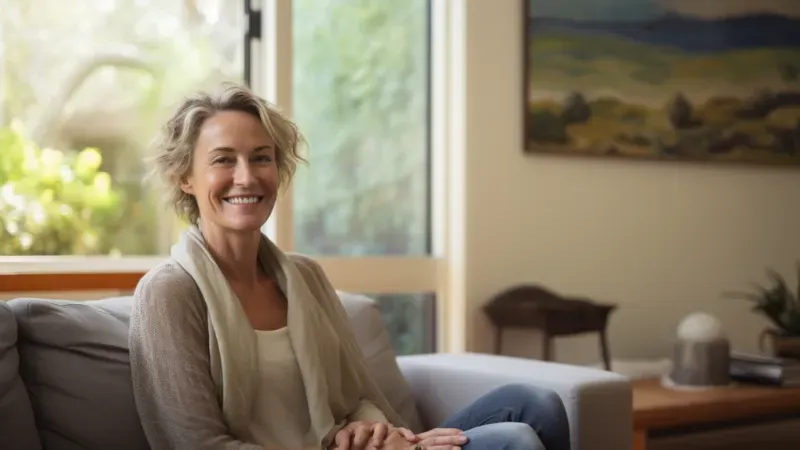
Clutter And Quality Of Life
If your space feels heavy or chaotic, it’s not just mess — it’s a reflection of stress, overload, and everything you’ve been carrying. Clutter affects how you feel, think, and connect. The good news? Healing your space gently can also heal your mind.
Watch the YouTube™ or read below:
The Hidden Enemy: Understanding Clutter
In every corner of our homes and corners of our minds, an unspoken challenge lurks: clutter.
It is everywhere in our homes and in our thoughts. . .
It's more than just misplaced toys or an overflowing inbox; it's a reflection of the chaos that sometimes rules our daily existence. While the world outside hustles and bustles, our inner worlds too can become victims of unnecessary noise.
Having too many things and thoughts can make us feel lost. The accumulation of items and thoughts not only challenges our sense of peace but also shifts us from the life we desire.
In this blog, we'll learn how clutter changes our lives and how we can make our spaces, inside and out, feel better.
Clutter Today: Let's Talk About It
Nowadays, it feels like there’s more clutter everywhere.
Many of us have too much stuff in our homes and heads. We buy things we don’t need because ads tell us to. Or we keep stuff "just in case."
We're always so busy that sometimes, we forget to tidy up. Our packed schedules often leave little time for organizing our surroundings. After a long day at work or handling responsibilities, decluttering takes a backseat.
Over time, small piles of clutter can morph into overwhelming heaps, making the task of tidying up seem monumental. Also, with phones and computers, digital clutter is a new challenge. It's like our closets and minds are full, and we need to find a way to make space again.
The Sneaky Emotions Behind Clutter: When you see a messy room, what's the first emotion that hits you? Is it the urge to clean it up, or maybe a tad bit of frustration? Well, for many of us, a cluttered space translates to a whirlwind of not-so-great feelings. Stress? Check. Anxiety? Yup. And let's not get started on the irritation.
Little Ones and Their Battle with Clutter: Now, picture the kiddos in your life. They're bright-eyed, curious, and just want a fun place to play. Clutter, however, has other plans. When toys, books, and clothes are scattered everywhere, our little ones can feel uncomfortable. Their safe space to play, learn, and grow? It gets buried beneath all the chaos.
The Chaos in Our Minds: And hey, our brains aren’t fans of messes either. When there's clutter everywhere, our thoughts get tangled. Our focus? It goes on a mini-vacation. And for those in school - from tiny tots to the older ones - messes can be a big, annoying distraction. Studying in chaos? Trust me, it's no picnic.
Friends, Family, and the Big C - Clutter: Ever been in a situation where friends or family wanted to drop by, but you hesitated? Maybe even made an excuse? We understand. It's the fear that they'll see our messy homes, and we'll feel, well, a bit embarrassed. Over time, that fear can grow. We might avoid social invites or not send any out ourselves.
The Multi-Faceted Impact of Clutter
Too often than not, we have all these things in our homes and in our heads. It's easy to see and feel. So, let's chat about why this happens and what it does to us:
1. Emotionally:
Clutter isn't just a physical presence; it’s an emotional burden too.
Being surrounded by disarray can make us feel overwhelmed and stressed. Internally, our minds can become cluttered with worries, grudges, regrets, and endless to-do lists. Think about the last time you saw a pile of bills or unfinished tasks. It wasn’t just a pile; it was a constant reminder of things undone, responsibilities unmet. This weight can chip away at our self-esteem and peace of mind, making us feel like we're constantly playing catch-up with our own lives.
2. Socially:
Our living spaces often reflect our internal states.
When our homes are cluttered, we might hesitate to invite friends over, with the fear of being judged. It's not just about the mess, but about the vulnerability it exposes. Over time, this can lead to isolation, as we might turn down social invitations or hesitate to create meaningful connections. A cluttered space can inadvertently become a barrier to forging and nurturing relationships.
3. Financially:
Clutter has a sneaky way of denting our wallets.
First, there's the obvious cost of purchasing items we don’t truly need. But it goes deeper than that. Lost bills can lead to late fees. Duplicate items bought because we can’t find the original ones add up. And then, there’s the value of the time spent searching for things amidst the clutter – time that could be spent working or doing something productive. Furthermore, in severe cases, the costs associated with repairing or replacing items damaged due to neglect or from being lost in the clutter can be significant.
4. Physically (Health of Family Members):
At first glance, a cluttered room might just seem messy.
But over time, clutter can become a breeding ground for dust mites, mold, and allergens, especially if it prevents regular cleaning. This poses a direct risk to our respiratory health. Moreover, piles of items can create hazards. Tripping over toys or slipping on a magazine left on the floor can lead to injuries. In extreme cases, clutter can also block exits or make it hard to move around, especially during emergencies, posing a direct threat to the safety and well-being of family members.
Understanding these effects gives us more reasons to be proactive in managing and reducing clutter in our lives, setting us on a path to better emotional, social, financial, and physical health.
Embracing a Clutter-Free Future
Decluttering isn't about throwing everything away and living with a single chair in your room. It's about balance. Start with categories, not rooms. Maybe begin with clothes, then books, then gadgets.
As you sift through your stuff, hold each item and ask if it adds value to your life. If it doesn't? Thank it for its service (yes, out loud!) and let it go.
The Breath of Fresh Space
With both our physical spaces and mental landscapes feeling cramped, there's a growing desire to find breathing room.
More people are turning towards minimalism, mindfulness practices, and digital detoxes to combat the pervasive clutter and rediscover simplicity.
Imagine walking into a room where you know where everything is.
It's like the room took a big, deep breath! The peace and clarity that come with decluttering are unmatched. Spaces become sanctuaries. Rooms invite relaxation, not stress. You rediscover the beauty of your home, and maybe, in the process, a bit about yourself.
The Joy of a Clutter-Free Life
With less stuff comes more freedom. The freedom to find things easily, to move around without tripping, and most importantly, to live with less weight on your shoulders.
A decluttered life is like upgrading to first class - there's just more space!
To wrap things now, are you curious about how clutter affects your own life? Don't just wonder – find out! Dive deep into understanding how clutter might be shaping your life and get personalized tips to break free.
“Remember, You Create The Life You Want”
FREQUENTLY ASKED QUESTIONS
Can clutter really affect my mood?
Yes — clutter can make your mind feel as busy as the space around you. When there’s too much to look at, your brain stays on high alert, making it harder to relax.
How does clutter impact relationships?
Clutter can quietly create tension, guilt, or shame — especially when family members see it differently. Talking openly about comfort and emotional safety helps everyone feel more supported.
Can decluttering improve my quality of life?
Absolutely. When you clear space with compassion, not pressure, your home starts to feel lighter — and so do you.




